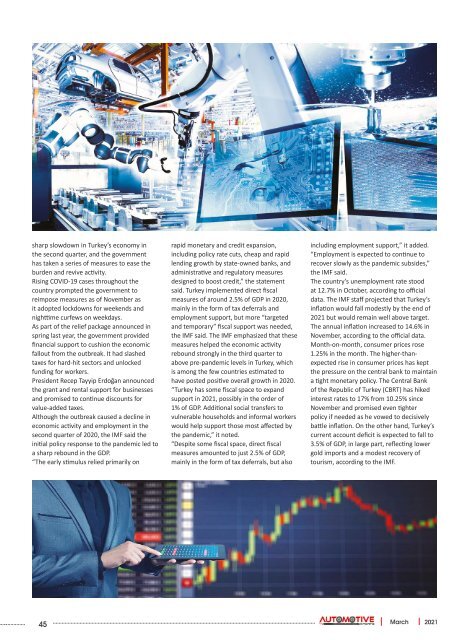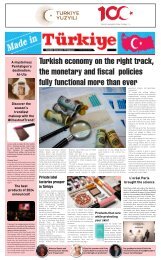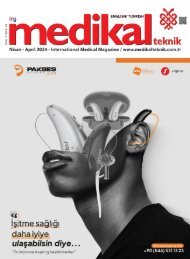Automotive Exports March 2021
Automotive Exports March 2021
Automotive Exports March 2021
Create successful ePaper yourself
Turn your PDF publications into a flip-book with our unique Google optimized e-Paper software.
sharp slowdown in Turkey’s economy in<br />
the second quarter, and the government<br />
has taken a series of measures to ease the<br />
burden and revive activity.<br />
Rising COVID-19 cases throughout the<br />
country prompted the government to<br />
reimpose measures as of November as<br />
it adopted lockdowns for weekends and<br />
nighttime curfews on weekdays.<br />
As part of the relief package announced in<br />
spring last year, the government provided<br />
financial support to cushion the economic<br />
fallout from the outbreak. It had slashed<br />
taxes for hard-hit sectors and unlocked<br />
funding for workers.<br />
President Recep Tayyip Erdoğan announced<br />
the grant and rental support for businesses<br />
and promised to continue discounts for<br />
value-added taxes.<br />
Although the outbreak caused a decline in<br />
economic activity and employment in the<br />
second quarter of 2020, the IMF said the<br />
initial policy response to the pandemic led to<br />
a sharp rebound in the GDP.<br />
“The early stimulus relied primarily on<br />
rapid monetary and credit expansion,<br />
including policy rate cuts, cheap and rapid<br />
lending growth by state-owned banks, and<br />
administrative and regulatory measures<br />
designed to boost credit,” the statement<br />
said. Turkey implemented direct fiscal<br />
measures of around 2.5% of GDP in 2020,<br />
mainly in the form of tax deferrals and<br />
employment support, but more “targeted<br />
and temporary” fiscal support was needed,<br />
the IMF said. The IMF emphasized that these<br />
measures helped the economic activity<br />
rebound strongly in the third quarter to<br />
above pre-pandemic levels in Turkey, which<br />
is among the few countries estimated to<br />
have posted positive overall growth in 2020.<br />
“Turkey has some fiscal space to expand<br />
support in <strong>2021</strong>, possibly in the order of<br />
1% of GDP. Additional social transfers to<br />
vulnerable households and informal workers<br />
would help support those most affected by<br />
the pandemic,” it noted.<br />
“Despite some fiscal space, direct fiscal<br />
measures amounted to just 2.5% of GDP,<br />
mainly in the form of tax deferrals, but also<br />
including employment support,” it added.<br />
“Employment is expected to continue to<br />
recover slowly as the pandemic subsides,”<br />
the IMF said.<br />
The country’s unemployment rate stood<br />
at 12.7% in October, according to official<br />
data. The IMF staff projected that Turkey’s<br />
inflation would fall modestly by the end of<br />
<strong>2021</strong> but would remain well above target.<br />
The annual inflation increased to 14.6% in<br />
November, according to the official data.<br />
Month-on-month, consumer prices rose<br />
1.25% in the month. The higher-thanexpected<br />
rise in consumer prices has kept<br />
the pressure on the central bank to maintain<br />
a tight monetary policy. The Central Bank<br />
of the Republic of Turkey (CBRT) has hiked<br />
interest rates to 17% from 10.25% since<br />
November and promised even tighter<br />
policy if needed as he vowed to decisively<br />
battle inflation. On the other hand, Turkey’s<br />
current account deficit is expected to fall to<br />
3.5% of GDP, in large part, reflecting lower<br />
gold imports and a modest recovery of<br />
tourism, according to the IMF.<br />
45 <strong>March</strong> <strong>2021</strong>

















